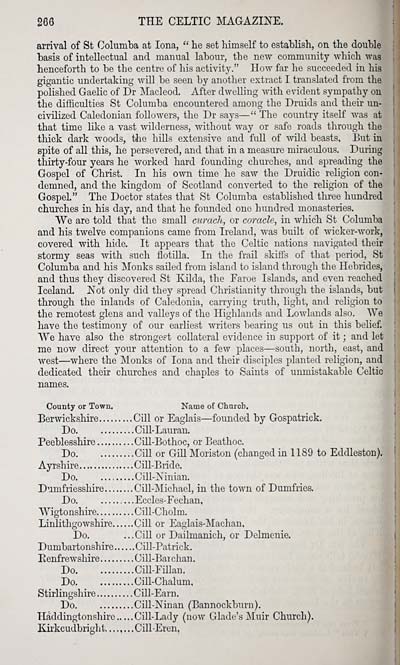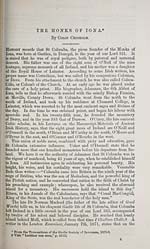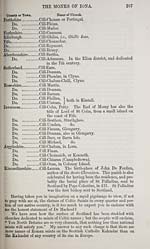Blair Collection > Celtic magazine > Volume 5
(276)
Download files
Complete book:
Individual page:
Thumbnail gallery: Grid view | List view

266 THE CELTIC MAGAZINE.
arrival of St Columba at lona, " he set himself to establish, on the double
basis of intellectual and manual labour, the new community which was
henceforth to be the centre of his activity." How far he succeeded in his
gigantic undertaking will be seen by another extract I translated from the
polished Gaelic of Dr Macleod. After dwelling with evident sympathy on
the difficulties St Columba encountered among the Dnuds and their un-
civilized Caledonian followers, the Dr says — " The country itself Avas at
that time like a vast wilderness, without way or safe roads throiigh the
thick dark woods, Uie hills extensive and full of wild beasts. But in
spite of all this, he persevered, and that in a measure miraculous. During
thirty-four years he worked hard founding churches, and spreading the
Gospel of Christ. In his own time he saw the Druidic religion con-
demned, and the kingdom of Scotland converted to the religion of the
Gospel" The Doctor states tliat St Columba established three hundred
churches in his day, and that he founded one hundred monasteries.
We are told that the small curacli, or coracle, in whicli St Columba
and his twelve companions came from Ireland, was built of wicker-work,
covered with hide. It appears that the Celtic nations navigated their
stormy seas with such flotilla. In the frail skiffs of that period, St
Columba and his Monks sailed from island to island through the Hebrides,
and thus they discovered St Kilda, the Faroe Islands, and even reached
Iceland. Not only did they spread Christianity through the islands, but
through the inlands of Caledonia, carrying truth, light, and religion to
the remotest glens and valleys of the Highlands and Lowlands also. We
have the testimony of our earliest writers bearing us out in this belief.
We have also the strongest collateral evidence in support of it ; and let
me now direct your attention to a few places — south, north, east, and
west — where the Monks of lona and their disciples planted religion, and
dedicated their churches and chaples to Saints of unmistakable Celtic
names.
County or Town. Name of Church.
Berwickshire Cill or Eaglais — founded by Gospatrick.
Do Cill-Lauran.
Peeblesshire Cill-Bothoc, or Eeathoc.
Do Cill or Gill Moriston (changed in 1189 to Eddleston).
Ayrshire Cill-Bride.
Do Cill-ISrinian.
Dumfriesshire Cill-Michael, in the town of Dumfries.
Do Eccles-Eechan,
Wigtonshire Cill-Cholm.
Linlithgowshire Cill or Eaglais-Machan,
Do. ...Cill or Dailmanich, or Delmenie.
Dumbartonshire Cill-Patrick.
Eenfrewshire Cill-Baichan.
Do Cm-Fillan.
Do Cill-Chalum,
Stirlingshire CiU-Earn.
Do Cill-Ninan (Bannockburn).
Haddingtonshire Cill-Lady (now Glade's Muir Church).
Kii'kcudbright. ....... Cill-Eren.
arrival of St Columba at lona, " he set himself to establish, on the double
basis of intellectual and manual labour, the new community which was
henceforth to be the centre of his activity." How far he succeeded in his
gigantic undertaking will be seen by another extract I translated from the
polished Gaelic of Dr Macleod. After dwelling with evident sympathy on
the difficulties St Columba encountered among the Dnuds and their un-
civilized Caledonian followers, the Dr says — " The country itself Avas at
that time like a vast wilderness, without way or safe roads throiigh the
thick dark woods, Uie hills extensive and full of wild beasts. But in
spite of all this, he persevered, and that in a measure miraculous. During
thirty-four years he worked hard founding churches, and spreading the
Gospel of Christ. In his own time he saw the Druidic religion con-
demned, and the kingdom of Scotland converted to the religion of the
Gospel" The Doctor states tliat St Columba established three hundred
churches in his day, and that he founded one hundred monasteries.
We are told that the small curacli, or coracle, in whicli St Columba
and his twelve companions came from Ireland, was built of wicker-work,
covered with hide. It appears that the Celtic nations navigated their
stormy seas with such flotilla. In the frail skiffs of that period, St
Columba and his Monks sailed from island to island through the Hebrides,
and thus they discovered St Kilda, the Faroe Islands, and even reached
Iceland. Not only did they spread Christianity through the islands, but
through the inlands of Caledonia, carrying truth, light, and religion to
the remotest glens and valleys of the Highlands and Lowlands also. We
have the testimony of our earliest writers bearing us out in this belief.
We have also the strongest collateral evidence in support of it ; and let
me now direct your attention to a few places — south, north, east, and
west — where the Monks of lona and their disciples planted religion, and
dedicated their churches and chaples to Saints of unmistakable Celtic
names.
County or Town. Name of Church.
Berwickshire Cill or Eaglais — founded by Gospatrick.
Do Cill-Lauran.
Peeblesshire Cill-Bothoc, or Eeathoc.
Do Cill or Gill Moriston (changed in 1189 to Eddleston).
Ayrshire Cill-Bride.
Do Cill-ISrinian.
Dumfriesshire Cill-Michael, in the town of Dumfries.
Do Eccles-Eechan,
Wigtonshire Cill-Cholm.
Linlithgowshire Cill or Eaglais-Machan,
Do. ...Cill or Dailmanich, or Delmenie.
Dumbartonshire Cill-Patrick.
Eenfrewshire Cill-Baichan.
Do Cm-Fillan.
Do Cill-Chalum,
Stirlingshire CiU-Earn.
Do Cill-Ninan (Bannockburn).
Haddingtonshire Cill-Lady (now Glade's Muir Church).
Kii'kcudbright. ....... Cill-Eren.
Set display mode to: Large image | Transcription
Images and transcriptions on this page, including medium image downloads, may be used under the Creative Commons Attribution 4.0 International Licence unless otherwise stated. ![]()
| Early Gaelic Book Collections > Blair Collection > Celtic magazine > Volume 5 > (276) |
|---|
| Permanent URL | https://digital.nls.uk/76452088 |
|---|
| Description | Volume V, 1880. |
|---|---|
| Shelfmark | Blair.6 |
| Attribution and copyright: |
|
| Description | A selection of books from a collection of more than 500 titles, mostly on religious and literary topics. Also includes some material dealing with other Celtic languages and societies. Collection created towards the end of the 19th century by Lady Evelyn Stewart Murray. |
|---|
| Description | Selected items from five 'Special and Named Printed Collections'. Includes books in Gaelic and other Celtic languages, works about the Gaels, their languages, literature, culture and history. |
|---|

